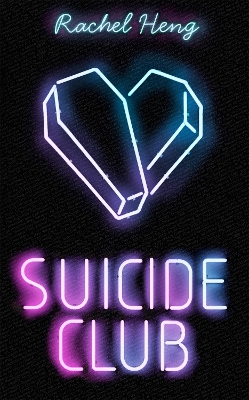"Something has to change. In being robbed of our deaths, we are robbed of our lives."Suicide Club is a chilling tale of a near-future dystopia where population decline has led to strict Sanctity of Life laws and systems to extend life ever longer. Poetically written, Heng weaves a dystopian nightmare that is plausible; however, I struggled to connect to the story as I had expected to and was left wanting much more.
The novel takes place in a New York City that closely resembles modern day, which both adds to the fear of this potential reality as well as creates a dissonance between the futuristic technologies that are not really explained. There is a lot of jargon used that did not seem to be explained, which I found to be distracting - like DiamondSkin is something that I should be intimately aware of, or that a Tender is something that I personally understand.
Suicide Club is told in two alternating points of view, something that I didn't realize right away. I found myself confusing backstories and just being confused until I went back and re-read. I love dual-POVs done well, but I struggle when the narrative shift isn't clearly notated and the perspectives bleed together. The first 20% of the book or so recalls the back histories of the two main characters and I struggled keeping everything straight.
I found myself not really caring much about the characters in the beginning of the book, although by the end I did care a bit for Lea and Anja. For me, the story was lacking in explanation of what steps led the population to this point, the political Ministry and its purpose left largely unexplored. With comparisons to Margaret Atwood, I found this to be particularly disappointing as I find Atwood's writing to be largely about the political systems as well as the system's impact on the central characters. I can see what Heng was trying to emulate, but for me it missed the mark.
"Someone once said that death was the best invention life had to offer."In my opinion, the overall story would have been stronger if the beginning of the novel spent a bit of time directly exploring the political climate, explaining what it meant to be a lifer or antisanc, how the tests at birth and the numbers play into the scheme of things. I found a lot of compellingly interesting tidbits about society that weren't explored. What is causing the population decline, what is the history of the Replacement business, why all the laws about taking care of yourself? Why the Lists and WeCovery? In a world where suicide is a sin and used as a form of civil disobedience, I feel that answering some of these questions would have strengthened the narrative. I found the lack of worldbuilding in a near-future dystopia to be the main reason that I struggled to connect with the story, and I was left wanting more.
I found Suicide Club to be an interesting and innovative premise, Heng writes with lyrical prose and I look forward to reading her future work and seeing her develop as a writer. This is more of a story about family and choice and less about the dystopian world. I think readers who are interested in family dynamics and the personal story of the characters will enjoy this book, but those who are looking for a dystopian thriller with political intrigue may be disappointed.
Thank you to NetGalley and the publisher, Henry Holt & Company, for providing me with an e-arc of this book in exchange for my honest review.
Blog | Twitter | Pinterest
